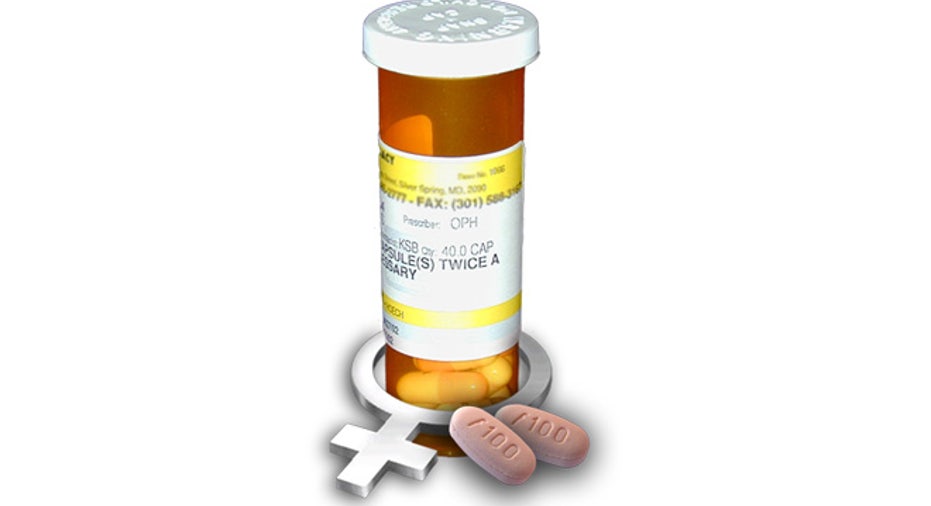The New Female Libido Drug: Hot or Hype?

Since its approval of Viagra, the FDA has been under pressure to find a treatment for female sexual dysfunction. In women, sexual function isn’t a mechanical (blood flow) issue like it is with men, and scientifically measuring female desire has been complicated. But that’s what Sprout Pharmaceuticals believes it has achieved with its new, FDA-approved Addyi (pronounced ADD-ee), for women with hypoactive sexual desire disorder (HSDD), or low sexual desire that causes marked distress or interpersonal difficulty and is not due to a co-existing medical condition, problems within the relationship, or medication.
Addyi hits the market next month and women can start asking their doctors whether or not they would be good candidates for a prescription. That conversation, alone, is groundbreaking, because until now, women suffering from low libido had little reason to bring it up.
Addyi, also known as flibanserin, works very differently than Viagra, in that it normalizes levels of two neurotransmitters in the brain: seratonin and dopamine.
“It enhances the effect of dopamine (libido booster) and minimizes seratonin (libido inhibitor) to normalize sexual desire,” according to Dr. Lauren Streicher, associate clinical professor of obstetrics and gynecology at Northwestern University’s Medical School and author of Sex Rx: Hormones, Health and Your Best Sex Ever.
Critics, however, aren’t buying it.
“I don’t think there’s a drug that will solve the desire issue,” said Dr. Thea Cacchioni, assistant professor of women’s studies at the University of Victoria and author of Big Pharma, Women, and the Labour of Love.
“No matter what’s going on in their bodies, what’s going on in their heads is very important,” said Christopher Ryan, co-author of Sex at Dawn: How We Mate, Why We Stray, and What it Means for Modern Relationships. “Unless someone’s come up with a pill that makes women feel respected, understood, and appreciated – I’m not buying shares.”
“This has been a long time coming,” said Dr. Lori Brotto, associate professor in the Department of Obstetrics and Gynecology at the University of British Columbia. “But this isn’t what we were waiting for,” she said, noting controversy over the drug’s effectiveness and its contraindication with alcohol.
For starters, the FDA said women taking Addyi reported an average of 0.7 more sexually satisfying events (SSE) per month over the placebo group, which doesn’t sound terribly significant. But there was a placebo effect. So even those taking the placebo reported an increase in SSEs, which would decrease the significance between the Addyi group and the placebo group.
Proponents say there were varying degrees by which it worked in the FDA trials, and those for whom it worked best reported having six to eight more SSEs per month, which is a lot for someone with very low or no libido, according to Sheryl Kingsberg, psychologist and chief of obstetric and gynecological behavioral medicine at University Hospitals of Cleveland.
“If you look at how it stacks up to any other CNS (central nervous system) drug, it really is good,” she said.
But then there’s the drug’s warning that women shouldn’t drink while taking the drug, as it could cause an unsafe drop in blood pressure. This could be a turn-off for many women, since Addyi has to be taken every day for up to two months before realizing any effects.
Kingsberg explained that the reason for the alcohol warning on the label is that the drug was tested in a severe alcohol challenge, where 25 people were asked to drink 1⁄2 to one bottle of wine in 10 minutes, in the morning, on an empty stomach while taking Addyi. Twenty-five percent of them reported being dizzy, which is why the drug warns users of possible fainting if it’s used with alcohol.
For some women, giving up drinking may be worth it if they suffer from HSDD.
“Women who are profoundly distressed with HSDD will have to make that decision,” said Cindy Whitehead, CEO of Sprout Pharmaceuticals, which was acquired by Canadian drug giant Valeant Pharmaceuticals (NYSE:VRX) for $1 billion shortly after the FDA approval.
Some physicians believe the drug can still be used with sensible alcohol use. According to Dr. Streicher, 58% of the women in the clinical trials identified themselves as social drinkers, and they continued drinking socially while taking Addyi. She said despite the warning, she would prescribe Addyi to patients who are social drinkers, depending on what they mean by “social.”
There are other female libido-enhancing drugs in the works. Dr. Brotto says Palatin Technologies (NYSE:PTN) bremelanotide is in Phase 3 clinical trials. And there are two other drugs, Librido and Libridos that are in much earlier phases.
Despite the controversy, most experts agree that starting the conversation about female libido is important, since the subject has been considered taboo for too long. And the societal implications of a successful female libido drug are huge.
“A sexless marriage is a vulnerable marriage,” says Dr. Susan Heitler, author of The Power of Two: Secrets to a Strong & Loving Marriage and poweroftwomarriage.com. “A female libido pill that can enhance sexual arousal for women has potential societal-wide implications if it can strengthen marriages,” she said.
“A woman’s sexual arousal enhances a man’s sexual arousal,” Dr. Heitler said. “A female libido pill therefore has potential to strengthen the sexual interest and enjoyment for both marriage partners.”



















